#tatiana diary entry
Text

Grand Duchess Olga Nikolaevna with her friend and fellow Sister of Mercy (nurse) Margarita “Rita” Khitorovo, Evpatoria Crimea 1916
“Monday, 16th May.
“…In the afternoon went to Anya’s dacha . Rita was there too. Sat on a marvelous beach near the sea, hunted for seashells. Had tea on her balcony. Returned at 6 o’clock…”
— Diary of Grand Duchess Tatiana Nikolaevna
Bonus! Hand tinted version by one of OTMA
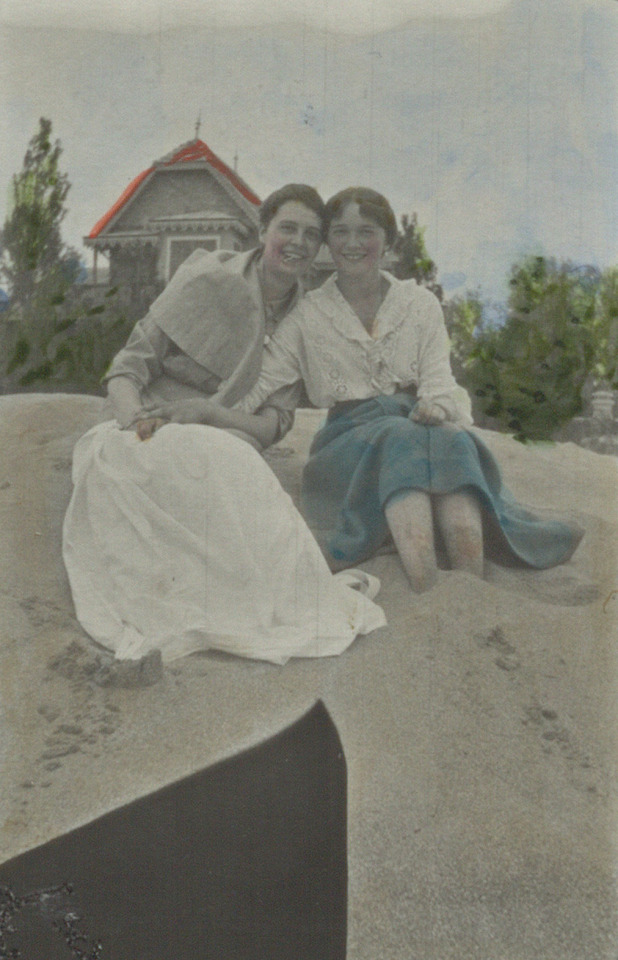
#olga nikolaevna#Margarita khitorovo#rita khitorovo#grand duchess olga#crimea#evpatoria#1916#tatiana nikolaevna#otma#romanov#1916 diary#diary entry
34 notes
·
View notes
Text
Tatiana’s Diary 8th/21st February 1913
“Had lessons in the morning. Had breakfast [we] four with Mama, Papa and U.[ncle] Georgi. In the afternoon skied down the hill. Mama and Alexei were there too. Had tea with Trina. Had a French lessons, and then Papa, Olga and I went to the theater. The opera, Lohengrin. Wonderfully nice, and I liked it a lot. Golska sang. Returned at 12 3/4. Went to bed.”
6 notes
·
View notes
Text
Romanov myths part three - did the Grand Duchesses go shopping?
Over the years, a prevalent belief that the Romanov Grand Duchesses, Olga, Tatiana, Maria, and Anastasia did not go shopping continues to be repeated. Some historians have even suggested that the girls did not know how paying for items worked. However, primary sources from people who knew the girls, were members of their entourage, and the Grand Duchesses' own diaries, tell a different story...
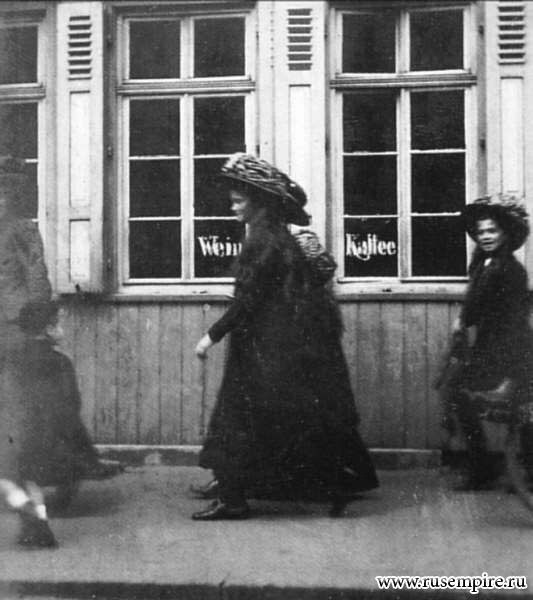
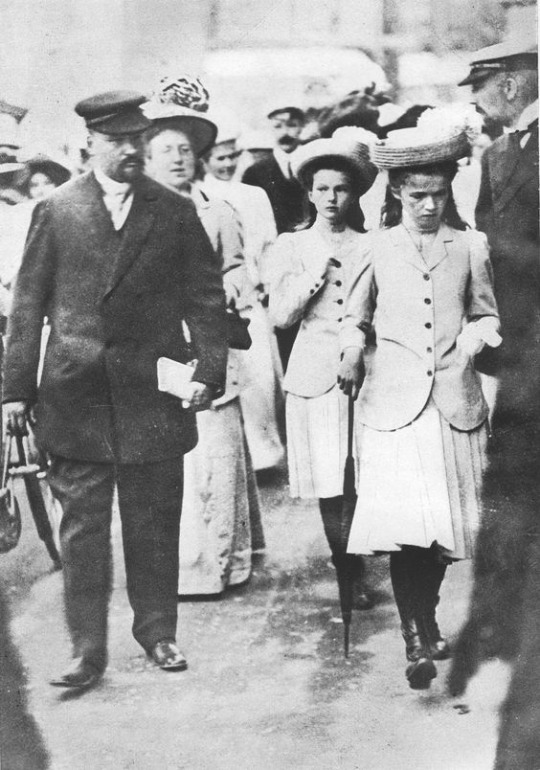
"Saturday. 10 August. … We walked along the historic boulevard and the main streets, but crowds followed us everywhere, so we were able to go into only 2 shops for a minute..."
"Friday. 15 November. Had lessons, after that went shopping for wool with Nastenka as usual.."
From Grand Duchess Olga Nikolaevna’s 1913 diary [my underlining]
In this entry, Olga describes shopping Countess Anastasia 'Nastenka' Vassilievna Hendrikova, who was a young lady-in-waiting at court and a particular favourite of the Grand Duchesses, often accompanying them on trips. As described in the first entry, it appears that safety and security concerns due to crowds, rather than a lack of understanding about shops, contributed to the Grand Duchesses not being able to shop frequently. Nastenka is frequently mentioned by the Grand Duchesses in their diaries, and volunteered to join the Romanov family in their house arrest and imprisonment. She was murdered by the Bolsheviks in September 1918.
"After coffee, I went for a walk with my pupils… They really liked to go to the shops and buy everything. Anastasia Nikolaevna was especially attracted to stores, where they sold doll shoes of various sizes… Tatiana Nikolaevna did not always accompany since the doctors found her heart was weak and she went with the Empress to take baths."
A Few Years Before the Catastrophe by Sofia Ivanovna Tyutcheva.
Sofia Ivanovna Tyutcheva was a maid-of-honour to Tsarina Alexandra Feodorovna, and in 1907 was appointed as governess to the Grand Duchesses. The Grand Duchesses referred to her as "Savanna". She was dismissed in 1912 when she voiced concerns over Grigori Efimovich Rasputin. She wrote a short memoir in 1945, and passed away in 1957.
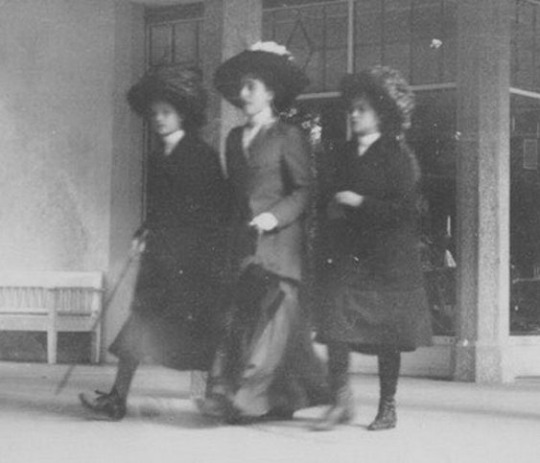
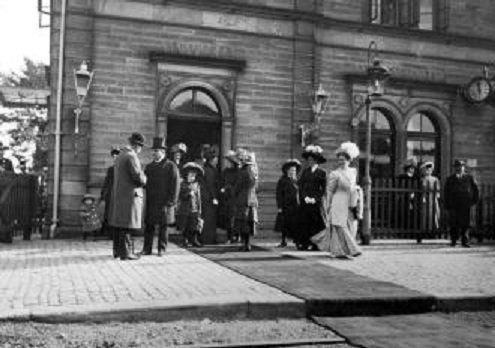
"[The] Grand Duchesses went shopping in the morning with one of the ladies-in-waiting to the Empress. They delighted in that because they could mix with the crowd and buy things just as everyone else did, and they were so pleased if they were not recognised at once." -- Upheaval - Olga Voronova
Countess Olga Konstantinovna Voronova was part of the aristocratic Kleinmichel family and in 1914, married one of the Romanov's favourite officers, Pavel Alexeievich Voronov. Through these connections, Olga Konstantinovna became a friend of the Grand Duchesses, exchanging frequent letters with Olga and Tatiana in particular, before and after the Revolution. She published her memoirs in 1932. Once again, it is inferred that being recognised and subsequent security concerns stifled the Grand Duchesses' shopping sprees.
Where did the myth come from?
It appears that the myth came about due to this extract from Margaretta Eagar, an Irish nanny who cared for the children from 1898 to 1904:
Her only knowledge of shops and shopping was derived from the toy and sweet shops in Darmstadt. One day she asked me why the Americans spoke English, not American. I told her the story of the Pilgrim Fathers, and described how they built houses and shops, and so made towns. She was exceedingly interested and inquired, ' Where did they find the toys to sell in the shops ? "
Six Years at the Russian Court, by Margaretta Eagar
It appears that some historians forgot that Margaretta Eagar moved on from her nanny position in 1904, when the eldest Grand Duchess was nine and the youngest was three, and perhaps did not look for sources from when the Grand Duchesses had grown up and had slightly more independence.
Over time, the myth appears to have been exaggerated and repeated until it became part of the 'folklore' surrounding the Romanov Grand Duchesses.
Whilst it is clear that the Grand Duchesses did enjoy going shopping in their lifetimes, safety and security concerns meant they could not enjoy shopping as frequently as other teenagers may have. In the same way royals today would not be able to go to shops without being recognised, there was a chance that a crowd could gather. Similarly, Olga and Tatiana appear to have shopped more than the younger pair, Maria and Anastasia, likely due to being older in age and therefore having more independence.
Photos:
First set, left: Olga, Anastasia (hidden behind Olga), and Maria Shopping in Germany, 1910. Right: Olga and Tatiana out shopping in the Isle of Wight, 1909, accompanied by Dr. Evgeny Botkin (in the suit)
Second set, left: Tatiana and Maria shopping with Sofia Ivanovna Tyutcheva, circa 1910. Right: The Grand Duchesses and their entourage by shops, most likely taken in Germany, 1910
Sources:
Journal of a Russian Grand Duchess: Complete Annotated 1913 Diary of Olga Romanov, Eldest Daughter of the Last Tsar, translator Helen Azar, (Independently published: 2015)
A Few Years Before the Catastrophe: The Memoirs of Sofia Ivanovna Tyutcheva, translator George Hawkins, (Independently published: 2020)
Upheaval, Olga Voronova (Woronoff), (New York; London: G. P. Putnam's Sons, 1932) -- Free to read online here
Six Years at the Russian Court, Margaretta Eagar, (New York: Charles L. Bowman and Company, 1906) -- Free to read online here
#Romanov#Romanov family#otma#Olga Nikolaevna#Tatiana Nikolaevna#Maria Nikolaevna#Anastasia Nikolaevna#sources#myths#myth-busting#Romanov sisters#Margaret Eagar#Margaretta Eagar#Sofia Ivanovna Tyutcheva#Nastenka Hendrikova#diaries#free to read#Olga Romanov#Tatiana Romanov#Maria Romanov#Anastasia Romanov
92 notes
·
View notes
Photo
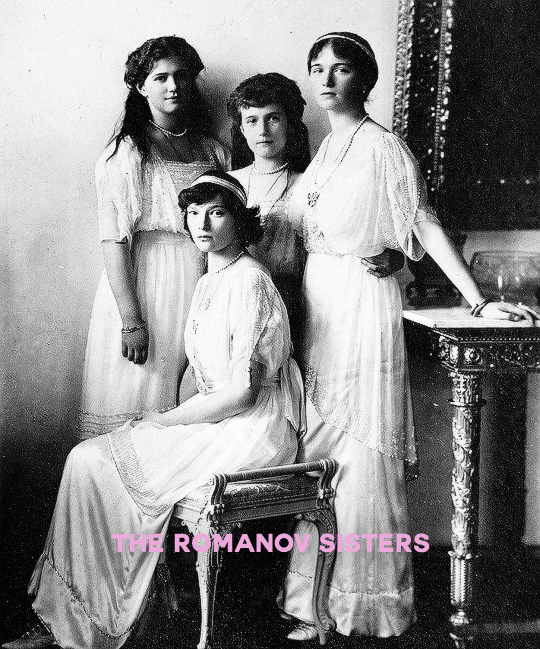
❁ Grand Duchesses Olga, Tatiana, Maria, and Anastasia Nikolaevna were the four daughters of Emperor Nicholas II and Alexandra Feodorovna of Russia. Known collectively as “OTMA”, the tragic lives of these four grand duchesses endlessly fascinate. Here is a list of resources to get to know the Romanov sisters a bit more deeply. ❁
⮞ Primary Sources
Within the last decade or so, much work has been done to translate the diaries and letters of the Romanov sisters. Additionally, primary source material from their parents and retainers provide excellent insight into their lives. These include:
The Diary of Olga Romanov: Royal Witness to the Revolution by Helen Azar • The first in an excellent series on each individual Romanov sister, Azar offers a biographical sketch and translations of the wartime diaries and letters (1914-1918) of Olga Nikolaevna in a narrative-style with additional documents of the period.
Tatiana Romanov, Daughter of the Last Tsar: Diaries and Letters, 1913–1918 by Helen Azar and Nicholas B. A. Nicholson • Translated for the first time in English with plentiful annotations, this book offers a narrative-style approach the diaries and letters of Tatiana Nikolaevna, including a biographical sketch and additional documents of the period.
Maria Romanov: Third Daughter of the Last Tsar, Diaries and Letters, 1908–1918 by Helen Azar and George Hawkins • The first English translation of the intimate writings of Maria Nikolaevna, this narrative-style book offers translations of Maria’s writings and letters, with a biographical sketch and additional primary source material on the third grand duchess.
Anastasia Romanov: The Tsar's Youngest Daughter Speaks Through Her Writings (1907 - 1918) by Helen Azar and George Hawkins • Here for the first time, readers can discover the real Anastasia Nikolaevna through her own letters and writings - translated into English with a biographical sketch and additional documents, illustrating in a narrative style a “surprisingly modern teenager from the dawn of the 20th century.”
Journal of a Russian Grand Duchess: Complete Annotated 1913 Diary of Olga Romanov, Eldest Daughter of the Last Tsar by Helen Azar • This volume comprises of diary entries of Olga Nikolaevna from the full year of 1913, which allow the reader a unique glimpse into the daily domestic routines of the Russian imperial family just prior to the outbreak of the First World War.
1913 Diary of Grand Duchess Maria Nikolaevna: Complete Tercentennial Journal of the Third Daughter of the Last Tsar by Helen Azar and Amanda Madru • The first translation of Maria Nikolaevna’s 1913 diary in its entirety, Maria’s journal records the daily routines of the Imperial family, from the mundane to the magnificent.
Maria and Anastasia: The Youngest Romanov Grand Duchesses In Their Own Words by Helen Azar • Known to their family and friends as "The Little Pair", Grand Duchesses Maria and Anastasia Nikolaevna are the main topic of this volume on their individual writings and letters.
Correspondence of the Russian Grand Duchesses: Letters of the Daughters of the Last Tsar by George Hawkins • This book contains a wide range of letters to and from the Grand Duchesses, both from relatives and friends, but also from strangers and people from parts of the world.
In the Steps of the Romanovs: Final Two Years of the Russian Imperial Family 1916-1918 by Helen Azar • Unique volume collection of first-hand accounts of the Romanov family exclusively through their diaries and correspondence.
Romanov Family Yearbook: On This Date in Their Own Words by Helen Azar and Amanda Madru • A unique edition which commemorates the last Romanovs through a collection of personal documents that recount their daily lives, ranging over a decade. This book contains 365 diary entries, letters, and photographs–one for each day of the year—including some previously unpublished material.
Russia’s Last Romanovs: In Their Own Words by Helen Azar and Eva & Dan McDonald • In this book, you will follow the events which led up to their eventual tragic fate through personal words of each family member, as well as their close friends and associates. Their letters, diaries, and postcards – many of which have been compiled into English here for the first time.
A Lifelong Passion: Nicholas and Alexandra: Their Own Story by Sergei Mironenko and Andrei Maylunas • A large collection of letters, diaries, and writings of Nicholas II and Alexandra Feodorovna and their five children, this volume naturally includes much first-hand information on the Romanov grand duchesses.
The Last Grand Duchess by Ian Vorres • A memoir/biography of Aunt Olga Alexandrovna, whom OTMA were particularly close, offers much first-hand information on the sisters’.
The Romanov Royal Martyrs: What Silence Could Not Conceal by St. John the Forerunner Monastery • This beautifully-illustrated, unique volume draws on letters, testimonies, diaries, memoirs, and other texts never before published in English to present a unique biography of Tsar Nicholas II, his wife, four daughters, and son.
The Life and Tragedy of Alexandra Feodorovna: Empress of Russia by Sophie Buxhoeveden • A unique first-hand account of a close friend of Empress Alexandra, who also served as a lady-in-waiting and close confidant of the four sisters. A wealth of information and anecdotes on the lives of the girls’ full up the pages of this volume, including their lives in captivity.
Six Years at Russian Court by Margaret Eager • The memoirs of the governess of the grand duchesses, Eager offers the most complete first-hand account of the sisters’ childhoods.
Thirteen Years at the Russian Court by Pierre Gilliard • The best first-hand account of the life of the last Imperial family of Russia was written by Pierre Gilliard, French tutor to the Tsar's children.
Memories of the Russian Court by Anna Vyrubova • Memoirs of Alexandra’s closest friend, a lady-in-waiting to the empress, Anna’s memoirs, like Buxhoeveden’s, offers particular insight to the life of Alexandra Feodorovna and her four imperial daughters.
The Real Tsaritsa by Lil Dehn • A memoir of the court by Alexandra’s lady-in-waiting, Dehn with close with the Imperial family and the Romanov sisters in their last few years.
⮞ Historical Novels
As many Romanov enthusiasts knows, it is incredibly difficult to find quality historical fiction on the last Romanov family. There are important exceptions, however:
The Lost Crown by Sarah Miller • Olga, Tatiana, Maria, and Anastasia. Like the fingers on a hand--first headstrong Olga; then Tatiana, the tallest; Maria the most hopeful for a ring; and Anastasia, the smallest. These are the daughters of Tsar Nicholas II, grand duchesses living a life steeped in tradition and privilege. Highly praised for its historical accuracy and individual voices given to each grand duchess, Sarah Miller’s young adult historical fiction book can serve itself as a great starting point on the Romanov sisters, fiction or nonfiction.
Anastasia and Her Sisters by Carolyn Meyer • A young adult historical fiction novel from the point of view of Anastasia, this generally accurate book follows the lives of the Romanov sisters from their childhood to young women in captivity.
Anastasia: The Last Grand Duchess, Russia, 1914 by Carolyn Meyer • A well-beloved middle-grade novel written in the style of a fictionalized diary of Anastasia.
Rubies in the Snow: Diary of Russia's Last Grand Duchess 1911-1918 by Kate Hubbard • Another fictionalized diary of Anastasia Nikolaevna, this book follows the grand duchess across seven years.
The Last Grand Duchess: A Novel of Olga Romanov, Imperial Russia, and Revolution by Bryn Turnbull • I have admittedly not read this book yet, so perhaps it is taking a huge chance to recommend this book; however, it is a new first-person novel of Olga Nikolaevna that has been well-received by readers and I haven’t found a trace of the usual sensationalism in the book’s reviews.
⮞ Secondary Sources
While there has yet to be a definitive combined biography of the four Romanov sisters, there are a number of nonfiction works that include their lives woven into their narratives. These include:
Anastasia’s Album by Hugh Brewster • A beautifully illustrated young adult nonfiction book on Anastasia Nikolaevna and her sisters.
The Romanovs: Love, Power, and Tragedy by A. N. Bokhanov • This book provides an enthralling description of the last Romanov family. It is Told through the diaries and family albums of the last Tsar and Tsarina, and included for the first time in print the diary entries and letters of the grand duchesses. Hundreds of unique and historic photographs from the personal photo albums of Nicholas and his family complete this volume.
Nicholas and Alexandra by Robert K. Massie • A masterful classic of nonfiction, this book is considered by many to be the standard biography of the last Imperial Family of Russia. Written by Robert Massie with much research work done by Suzanne Massie, this book is a generally great nonfiction starting point on Nicholas, Alexandra, and their five children.
The Family Romanov: Murder, Rebellion, and the Fall of Imperial Russia by Candace Fleming • A young adult historical biography of the last Romanov family of Russia. This well-researched and well-annotated book provides information not only on the history of Nicholas, Alexandria, and their children but also on the Russian people living at the time and on the social conditions that contributed to the family's demise.
The Resurrection of the Romanovs: Anastasia, Anna Anderson, and the World's Greatest Royal Mystery by Greg King and Penny Wilson • This groundbreaking book serves three purposes: first, a biography of Anastasia Nikolaevna; second, a recounting of the tale of “Anna Anderson”; and third, a biography of Franziska Schanzkowska and how under the guise of Anna Anderson she falsely claimed to be Grand Duchess Anastasia Romanova.
⮞ Websites
The internet has proven to be an endless mine of Romanov material on the grand duchesses and the imperial family as a whole. These websites are particularly good starting points:
Alexander Palace Time Machine • The world’s preeminent Romanov website--a treasure trove of photos, letters, books, articles, and more.
Liviadia.org • A tribute to the Romanov children, featuring scrapbook-style biographies and photo albums of each grand duchess.
The Romanov Family • A popular Romanov history website focusing on Nicholas, Alexandra, the four sisters, and Alexei in their own words, run by translator Helen Azar.
Frozentears • A media-rich memorial to the last Imperial family.
Romanov Memorial • A virtual tour of the Ipatiev house.
Yale Beinecke Albums • Browse six of Anna Vyrubova’s personal photo albums, loaded with candid snapshots of the grand duchesses and their family.
The Romanov Royal Martyrs Project • A multimedia dedication to the last Imperial family of Russia.
⮞ Films, Documentaries, & Footage
While there have been numerous films and documentaries on the Romanovs, only a small amount steer away from the sensationalism often associated with the family, particularly the imposters. Documentaries and films that focus on the real family instead includes:
The Romanov Four Sisters (2021) • A documentary on the Romanov sisters by The Romanov Royal Martyrs project, this two-part series is a purposeful remake of a far less well-received documentary. This new version features colorized pictures by Olga Shirnina (Klimbim), newsreel footage, and a selection of photographs from the State Archive of the Russian Federation (GARF).
OTMA — Grand Duchesses Olga, Tatiana, Maria & Anastasia (Footage) • An hour length collection of the old archival film footage with the Russian Grand Duchesses Olga, Tatiana, Maria and Anastasia Romanov of Russia from the Russian State Documentary Film & Photo Archive at Krasnogorsk (RGAKFD).
Last of the Czars (1996) • A three-part documentary on the last imperial family of Russia, Discovery Networks.
Russia’s Last Tsar (1995) • A documentary on Nicholas II and his family, National Geographic Video.
The Romanovs: An Imperial Family (2000) • A Russian historical drama film about the last days of Tsar Nicholas II and his family. It has been praised by Romanov enthusiasts for its depictions of the Romanov sisters.
Nicholas and Alexandra (1971) • The film adaptation of Robert K. Massie’s book of the same name, this historical drama focuses on the imperial couple and their family throughout Nicholas’s reign.
#historyedit#royaltyedit#romanov#romanovedit#olga nikolaevna#tatiana nikolaevna#maria nikolaevna#anastasia nikolaevna#otma#anastasiaedit#anastasia#russian history#history#sources#our edits#writing#20th century#photo#by olishka#women's history#full disclosure that this op finds helen rappaport a revolting human being not only for her sensationalism and meaness but also her right-wi#ng politics#however the book is 'by necessity' listed here i do not actually reccomend it#i also have a problem with massie that i hint at in this post but i still rec it lol#im a bit weary of the book by turnball#i also cant stand greg king/penny wilson lmao but the book rec here is their sort of redemption arc#and its a great book honestly
399 notes
·
View notes
Note
Also a Russian article about Alexander and Olga Nikolaevna: (so that it would not be difficult for you, translation)
Speaking about the loves of Grand Duchess Olga Nikolaevna, it is impossible to ignore this one. Probably, it was a very short infatuation – maybe just a WILLINGNESS to fall in love – but it was this feeling that had every chance of getting continued. After all, Olga finally liked an equal in position: the prince of a foreign power.
In December 1913, Olga realized that her "sun" was Pavel Voronov (more?) he does not reciprocate her, and made several emotional entries about him in his diary, using a secret cipher. His behavior confuses and worries her, feelings are looking for a way out... on December 21, the denouement follows: "I found out that my S. is marrying Olga Kleinmichel. God send him happiness, my beloved S. It's hard. Sadly. He would be pleased." Olga also encrypted this entry. It would seem that the time has come to immerse yourself in experiences for a long time, but after a few weeks the mysterious cipher appears in the diary again. And if earlier he hid only declarations of love for Voronov, now Olga writes about something else (further encrypted fragments are italicized):
"January 12.
Alexander Serbian arrived (In Russian uniform. Wow, what eyes).
January 15th.
At 9:00, my Dad and Aunt and I went to St. Petersburg for the consecration of the new church of the Fedorovskaya Mother of God in honor of the 300th anniversary. It lasted from 10 to 1 ¼. Metropolitan, etc. A bright, large, good church. I was standing next to Alexander the Serbian, he was a little further away. Wow, wow what.
January 17th.
We had breakfast with Dad, Aunt, Kostya and Alexander. I sat with him. Cute, embarrassing and beautiful horror. Wow wow what.
January 19th.
Mom I don't know how. I fell asleep after 3 hours at night. God save her and everyone , and Alexander S.
January 23.
After in the Winter Courtyard. a big breakfast. Then we talked. I've been with Alexander for quite a long time. God save him.
The 25th of January.
We had breakfast with Papa, T. Olga, gr. Fredericks and Alexander S. He came to say goodbye. He's leaving in 2-3 days, it's a pity, dear."
Alexander Karageorgievich was 7 years older than Olga. He had a lot to do with Russia: he had Russian tutors, was the godson of Alexander III and the named son of Nicholas II; studied at the School of Jurisprudence and in the Page Corps in St. Petersburg. He became heir to the throne in 1909, after his elder brother George was forced to give up his rights to the throne under the pressure of a scandal.
In the same year, Alexander almost asked for the hand of Princess Tatiana Konstantinovna. The Serbian minister and even the father-king personally made a cautious reconnaissance on this matter. But to the Konstantinovichs, the position of the Karageorgievich dynasty on the throne seemed too shaky. K.R., Tatiana's father, wrote in his diary: "I told her in detail about the claims of the Serbian court and about the reasons prompting us to advise her to refuse this offer. Although she rather likes Sandro Serbian, she did not hesitate to give him up."
However, a year later the families still became related: Alexander's sister Elena married Grand Duke John Konstantinovich. For the Karageorgievichs, this was a great success, because they took the throne only in 1903 by a coup. In Europe, they were not really recognized, and not all Romanovs were disposed to them.
In 1912-13, Alexander managed to show valor in the Balkan wars. And then he thought about getting married again, but now he was interested in the daughter of the tsar himself. ONLY WHICH ONE?
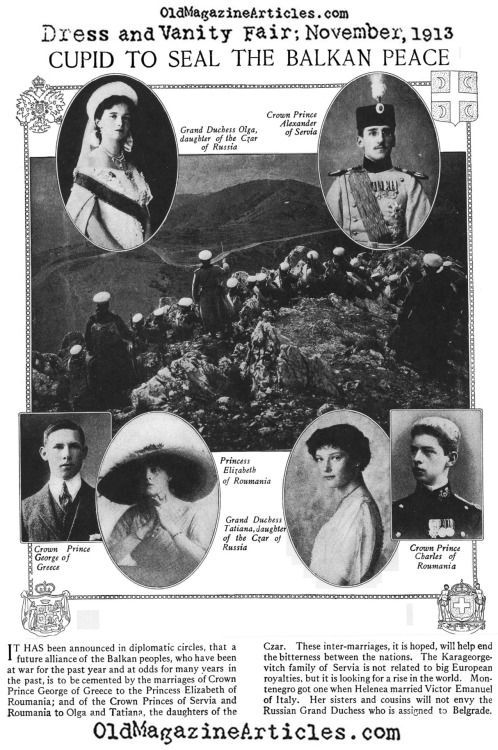
In this newspaper for November 1913, it was suggested that Olga would become the wife of Alexander of Serbia, and Tatiana – Karol of Romania. On the other hand, the English Wikipedia, with reference to Serbian archives, assures that Prime Minister Nikola Pasic wrote to Nicholas II in January 1914 about Alexander's intention to marry one of the Grand duchesses. Nikolai did not object and even noticed the interest that his daughter showed in the prince – but it was allegedly not Olga, but Tatiana. (And Russian Wikipedia generally assures: "Tatiana and Alexander wrote letters to each other until their death. When Alexander found out about Tatiana's murder, he was confused and almost committed suicide").Alexander's sister Elena, in her memoirs, which I have not yet been able to find, seemed to say that she noticed some "chemistry" between Alexander and Olga. Well, Olga's diary allows us to conclude that Alexander was not indifferent to her, and I think the Serbian heir himself paid attention to her. You can only guess what prevented you from taking the next step.In the spring, Olga is fond of Molokhovets, then the war begins, but all this does not prevent her from remembering Alexander on various occasions:"February 24.At 12 o'clock my mother received the Bavarian, Belgian, Danish and Serbian envoys (Nalajovic. So reminds Alexander C).February 25.(in small print: I haven't seen Alexander for a month since)March 25.I haven't seen Alexandra for 2 months. <...>(added, apparently, later) I haven 't seen Alexander S. for 2 months .September 4.The Pope gave Alexander of Serbia the St. George Cross 4 art . I am very happy. God help me.October 6.John, Gabriel and Kostya and Elena had lunch. They told me a lot of interesting things. She's a piece of Alexander, and I love her.October 16.At 7 o'clock we went to the infirmary with Mom, we went to everyone, and talked to K. and I. in the corridor. Everyone knows Alexander by his body."

Alexander was a thin brunette with a mustache and large facial features (and with "WOW" eyes) – this is exactly the type of appearance that has always attracted Olga. Besides, apparently, he was a really nice person. "The prince turned out to have a kind and friendly character," writes the grandson of his tutor, the famous priest Gleb Kaleda. "To please his tutor, the prince wrote to him in Russian, asking for forgiveness in advance for possible mistakes, although there were none." He was remembered as a tactful person, sometimes shy and prone to melancholy, a lover of reading – there is some similarity with Olga's character.Olga did not see Alexander again, but a year later she noted in her diary the anniversary of his arrival:"January 12, 1915.The year that I saw Alexander at Vsevolod's christening.January 15th.The year is consecrated. churches. Alexander.January 17th.Mordvinov and Count Fredericks were having breakfast. And a year ago Alexander. God bless him."It seems that even in the spring of 1916, Pasic expressed the hope that Olga would become the Serbian queen. But in January of this year, the date of the meeting with Alexander was not noted in the diary. At this time, Olga hardly thought about anyone other than Dmitry Shah-Bagov. (By the way, here her fate again intersects with the fate of Tatiana Konstantinovna, who was very friendly with the elder daughters of Nicholas II. Instead of the Serbian prince, she married a simple Caucasian officer for love, and he even served in the Erivan regiment – like Olga's lover. Because She even knew Shah Bagov and calls him a "cute, cute boy" in a letter. Surely Olga was thinking about what could repeat her path).But in 1917 Olga remembers again:"January 17th. Exactly 3 years ago today Alexander Serbsky had breakfast with us." Here the name is also written in cipher, and this is the last encrypted entry in the diary.
Olga Nikolaevna's biographers like to repeat that she wanted to stay in Russia, so she did not marry the Romanian heir Karol. The interest in Alexander the Serbian shows that, most likely, it was not in the country: it was just Karol who was unsympathetic to Olga. I think she understood that sooner or later she would have to leave her homeland. It is unlikely that the rumors had passed her by, she knew who her husbands were supposed to be, and she did not mind falling in love with a cute Orthodox prince. Maybe by the beginning of 17, she returned to thinking about him because someone had dispelled her hopes for a happy morganatic marriage? Although what could be a wedding when the revolution is already at the threshold. What kind of fate would await her in a small semi-literate kingdom, forever torn apart from the outside and from the inside?Alexander married in 1922 the sister of the same Karol (there is a version that he dragged on for so long, because until then he did not believe in the death of Olga). It seems that he became a good family man, ruled his country for more than 10 difficult years. Yugoslavia in the 20s became a fragment of the Russian Atlantis, the center of white emigration. Sometimes there is an opinion that Alexander was so supportive of Russian refugees in memory of his first love – "Olga/Tatiana." But I think Russia meant a lot to him anyway. Alexander was killed in 1934 by a terrorist, his family fled the Nazis during the war and never returned to their homeland. Well, instead of Maria, Olga could become a Romanian widow and exile… No matter how her fate turned out, it would not be easy. The time of the Slavic monarchs has passed.
Thank you for sharing!!
27 notes
·
View notes
Photo
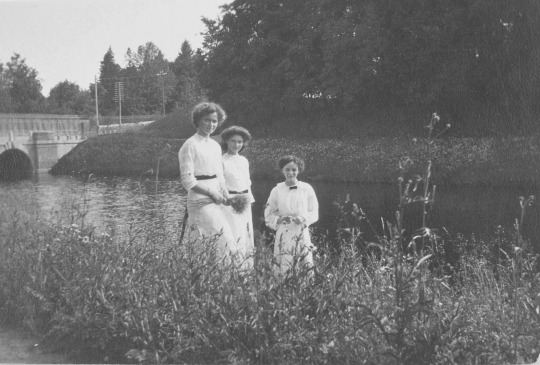

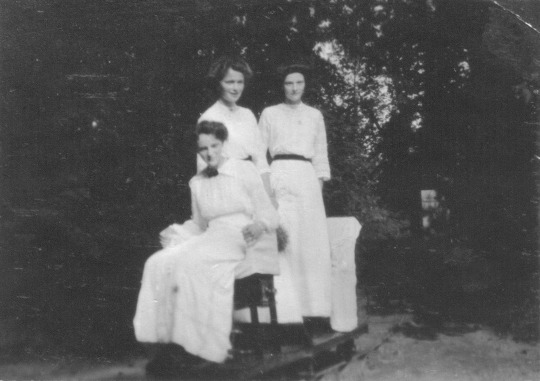
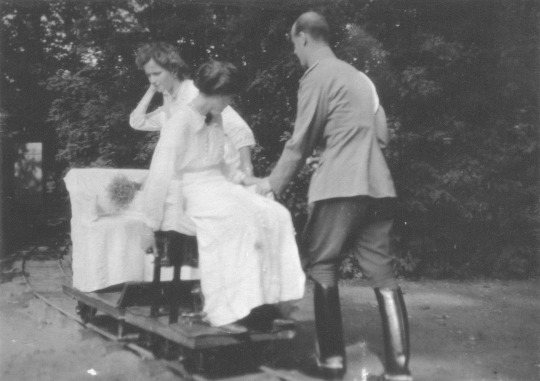
17th June 1912 part 1/2
Grand Duchess Olga Nikolaevna, Grand Duchess Tatiana Nikolaevna, Princess Irina Alexandrovna and Grand Duke Michael Alexandrovich in Gatchina, 17th June 1912.
"17th/30th June. Sunday.
Before obednya, walked with the sisters in the garden. Papa had breakfast at the Grand P[alace] with the Danes, and we were with Mama and Sonya Den. In the afternoon, we 5 drove to Gatchina in motors. Played and walked around the garden with Irina. Papa and Mama came to Grandmama for tea and we all returned by train. After dinner, NP. was with us. How happy I am. Thank you Lord!"
(1912 Diary of Grand Duchess Olga Nikolaevna)
Photos from:
SCIENCE MUSEUM GROUP - Albums of Herbert Galloway Stewart
Grand Duchess Xenia Alexandrovna's 1912-1913 Album / page 7b, 8 - photo n° 103, 104, 109
You can also find more photos, diary entries, letters here : Last Romanovs VK
#1912#Olga Nikolaevna Romanova#Tatiana Nikolaevna Romanova#irina alexandrovna#gatchina#michael alexandrovich
73 notes
·
View notes
Note
🥳🥳🥳 Oooh yay! 1k! 🥳🥳🥳

How about a little 😈 ?
"Sweetheart, what did you bury in the garden?" with whoever vibes with the sentence for you — I love them all and everything you write.❤️❤️❤️
(so so glad I made it back in time to celebrate)
So you're the last one, and you've triggered a story in my head I never thought I'd have. So bravo for that, you made me write Grace in more than just passing reference.
Anyone that's been around here knows I don't like her, I certainly don't trust her, but this is unequivocally her.
And this warrants much more than 5 sentences.
---

No one expected Tommy's wife to survive, including the devil of Small Heath himself. He thought he watched her die on the floor of the ballroom, covered in blood and clutching her husband with one hand and the cursed stone in another. Tommy screamed for the finest doctors but didn't really expect them to save her.
They did.
She was placed in a wing of the house that wasn't in use. She had round the clock care through her entire coma. Tommy told no one, expecting her not to survive. Troubled and heartbroken, he carried on with his plans. He did not correct anyone when they called him a widow. Soon he would step into the role, so why not try it on beforehand?
When she woke up, weak and reaching for her boys, Tommy could scarcely believe it. And once Grace had settled into reality, catching up to Tommy's schemes while she was dreaming and healing, she agreed that for the moment she should remain dead. She would make her grand entry back into the land of the living once Tommy had gotten the jewels and the information and left the Russians mourning their choices.
Grace floated through the house, a ghost or a shadow that even the staff did not see. And as a ghost, she was able to see things she otherwise wouldn't have as the mistress of the house. She learned things she otherwise wouldn't have learned. Like her husband kept a diary of plans of sorts hidden deep within the pages of a Latin book in his office.
So she learned about the Russians. And the jewels. And Alfie Solomons. And Tatiana.
Oh, Tommy had much to explain.
Grace always met Tommy in her bed, a weak smile on her face. She pretended to walk feebly. She shook just a little more. How else would she have the freedom to learn all of her husband's dirty secrets?
No wonder Tommy kissed her cheek and patted her hand before leaving the wing to invite Tatiana into their marriage bed. He thought she would never know.
Instead, she watched in the shadows as the raven-haired Russian stalked around her house half naked in the middle of the night, giving orders and nearly shooting her husband.
Grace seethed, but she hid it. There was a time and a place for everything.
And then Thomas handed their child off to a stranger to be taken to a predator. And in his grief he sent his cousin to collect Charlie while he faced his demons to dig for jewels.
When she found her son in bed, clean and angel-faced, she knew Tommy's plans had come to fruition. When she saw the note for the jewel sale in his calendar, she knew he had finally finished his business with the whore.
Then her own plans could begin.
Thomas returned home that evening, humming a tune and a pep in his step for a job well done. He found his wife in the garden, planting a new row of rose bushes, dirt smeared along her concentrated brow. He smiled and kissed her temple and she smiled in return.
"Late in the day for planting, eh?" He hummed. "You should wash up and sit with me for supper."
Grace smiled, nodding as she stood up from her task.
"I would love to," she said. "I'll have someone fetch Charlie and we'll eat as a family."
Grace left for the house, leaving Thomas standing beside the newly planted rose bushes. He teetered on his heels for a moment, enjoying the air, when he noticed a gleam in the dirt.
Thomas leaned down and picked up a familiar ring. He squinted, realizing the ring was not his wife's. He had seen it on his night stand before, the dark jewel glittering in the firelight as the Duchess ran her foot along his groin.
"Sweetheart, what did you bury in the garden?"
#murderousgingers 1k bash#promptmurderousginger#peaky blinders#Tommy Shelby#Tommy Shelby x Grace Burgess#grace Shelby#grace burgess#i really don't like grace#i have the best mutuals i stg#storytime with murderousginger
33 notes
·
View notes
Text
emma's dread regarding blackthorn hall has been a thread throughout sobh, and understandably! like a lot of shit has happened in this house. The sensor feels it, even when they first unpack it:
"It didn’t seem to be reacting to anything specific, it was more like it was reacting to the environment of the house, fussing about it like a grumpy baby."
emma later says that
"basically everywhere in this house is creepy except our bedroom, at this point."
which understandably would make one draw the conclusion that love and familiarity might be able to overcome the creepy dark vibes of the house. she expresses this in a later diary entry, hoping that the love of a whole family can metaphorically scrub this house clean
"when this project is complete and all the Blackthorns are here and can make it their own, this house could feel warm and friendly again."
but then the heaviness persists and emma has doubts. even before the curse was broken she expressed this thought to bruce
"there’s still that overall shroud of heavy memory that kind of hangs over the place, and no amount of new paint and replaced windows can help that."
even if/when the rest of the blackthorns move in, decorate their rooms and claim things as their own, that won't necessarily washaway the bad vibes, and as much as emma tends to brush it off, she's concerned about it.
once the curse is lifted, mina is stolen. this isn't necessarily to be blamed on the house, but emma still can't help connecting the dots and attributing the negative experience with the bad luck that seems to fill blackthorn hall like a noxious gas.
"maybe there’s something more deeply wrong with Blackthorn Hall than even a broken curse can fix. Or maybe I’m just feeling morbid and worried. Probably that."
emma isn't dumb, and I honestly think she isn't giving her intuition enough credit here. maybe she's hesitant to trust herself after everything with tatiana's diary. maybe she's too set on making sure this is a positive space for julian, to allow him the hope he has in it, which is something so new for them both. whichever it is, I think they should be paying attention to this heaviness, because there could very well still be mysteries and curses that haven't been touched, haven't made themselves known. and maybe they can continue to scrub them away, but what if it puts them in even more danger? at what point does walking away become the best option?
#im still not convinced there isnt a passage to a demon realm or inbetween space in bh#and i could very well see this radiating the negativity#but we'll see#sobh#secrets of blackthorn hall#emma carstairs#long post
15 notes
·
View notes
Photo
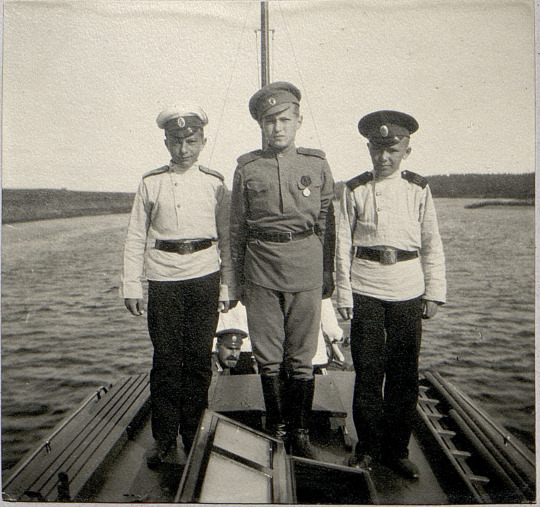
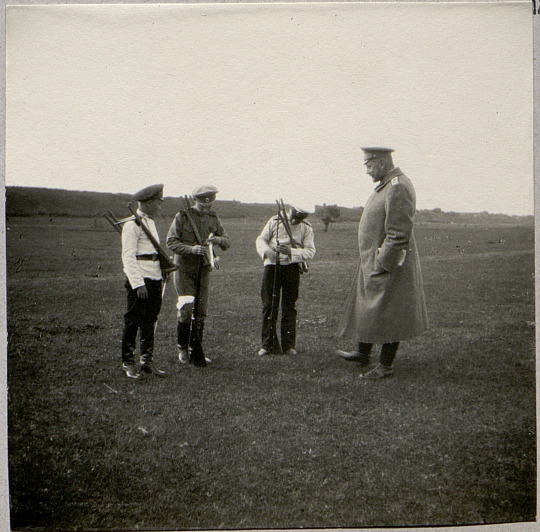
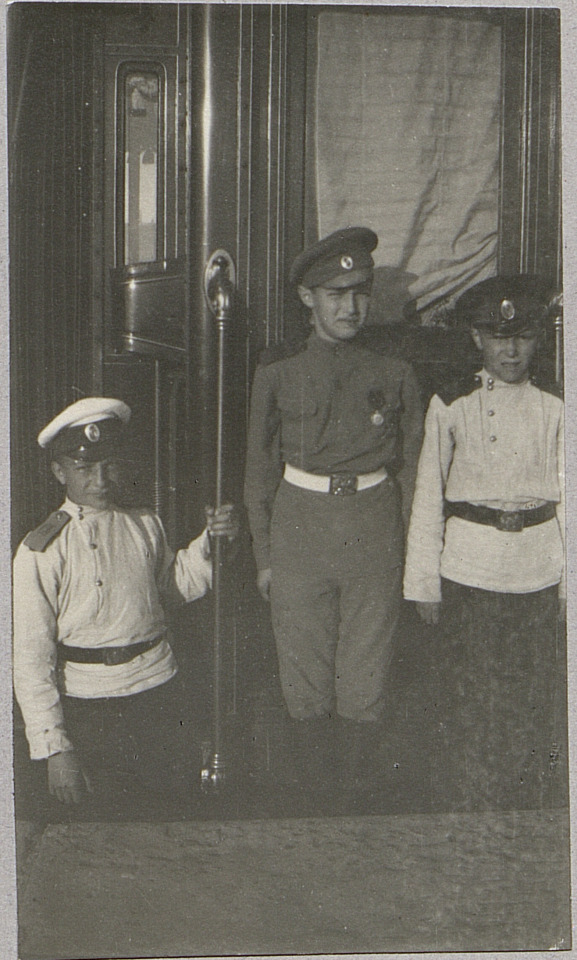
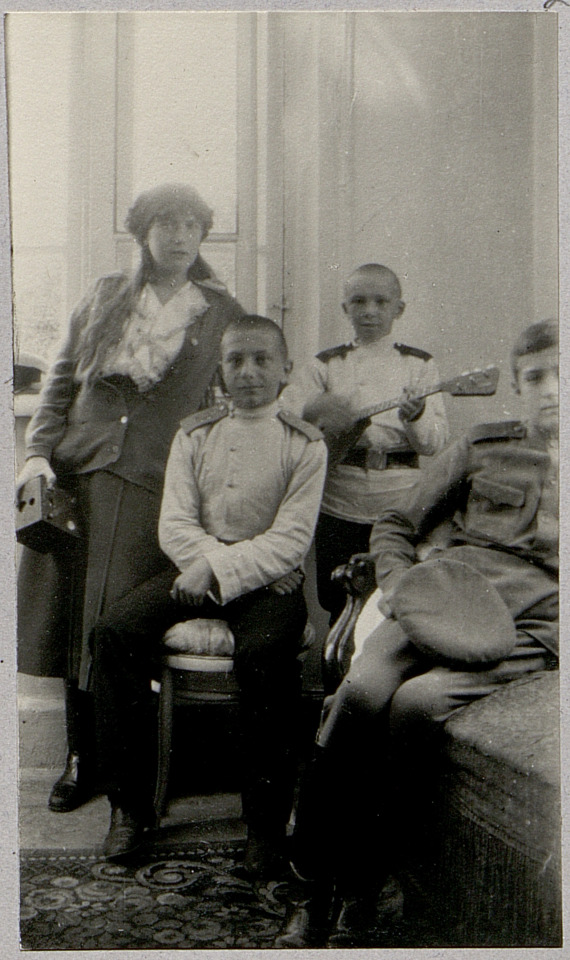
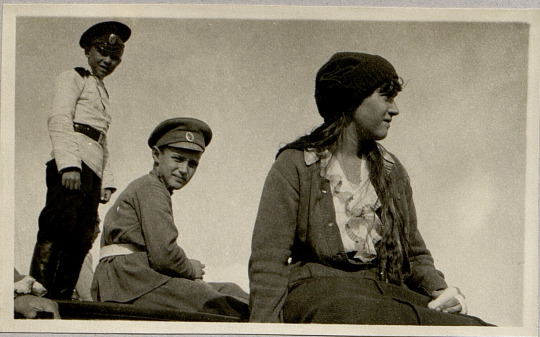
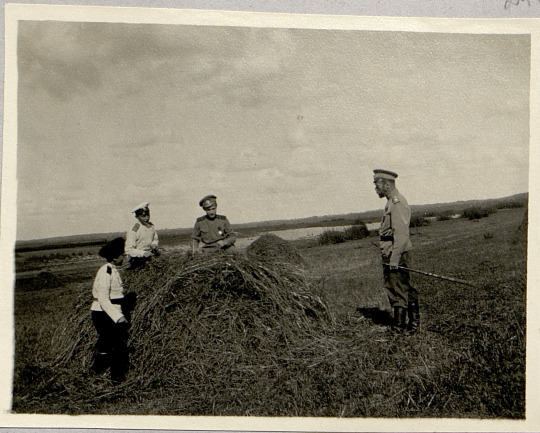
Cadets Evgeni Makarov and Vasili Agaev - Part IV
(The 1916 Album of Grand Duchess Tatiana Nikolaevna)
These six photographs come from the Album of Grand Duchess Tatiana Nikolaevna (Circa. 1916). If one peruses through the albums (generously scanned by Ilya Grigoriev), you can see that copies of the same photograph were pasted into various albums belonging to the Grand Duchesses, as well as, Their Majesties.
Cadets Makarov and Agaev (affectionately referred to as “Zhenya” and “Vasya” by the Tsesarevich, and his family), came to Stavka at Mogilev (General Headquarters) in mid-late Summer of 1916. In the Tsesarevich’s diary entries, his times spent at “HQ” were some of the happiest in his life. He felt the most freedom there as opposed to Tsarskoe Selo where he was surrounded always by “fussy women.”
________________________________________________________________
Photographs:
1. Tsesarevich Alexei Nikolaevich with Cadets Evgeni Makarov (right) and Vasili Agaev (left).
2. Tsesarevich Alexei Nikolaevich with Cadets Evgeni Makarov (left) and Vasili Agaev (right), as well as, an un-indentified man (far right).
3. Tsesarevich Alexei Nikolaevich with Cadets Evgeni Makarov (right) and Vasili Agaev (left).
4. Grand Duchess Anastasia Nikolaevna with Cadets Evgeni Makarov (back-ground, right) and Vasili Agaev (foreground, left), as well as, Tsesarevich Alexei Nikolaevich (far right).
5. Grand Duchess Anastasia Nikolaevna (foreground, far right) with Cadet Evgeni Makarov (back-ground, far left), as well as, Tsesarevich Alexei Nikolaevich (back-ground, center).
6. Tsar Nicholas II (far right) with Cadets Evgeni Makarov (far left) and Vasili Agaev (back-ground, center), as well as, Tsesarevich Alexei Nikolaevich (back-ground, center).
________________________________________________________________
Sources:
Альбом Татьяны Николаевны, 1916 год
Link of courtesy:
https://www.flickr.com/photos/149552988@N02/albums/72157711555338063
#evgeni makarov#vasili agaev#simbirsk cadet corps#orlovsky-bakhtin cadet corps#tsesarevich alexei#alexei nikolaevich#romanov#imperial russia#photographs#russian archival material#ilya grigoriev#russian state archives#great war#first world war#tribute post#1916
9 notes
·
View notes
Text
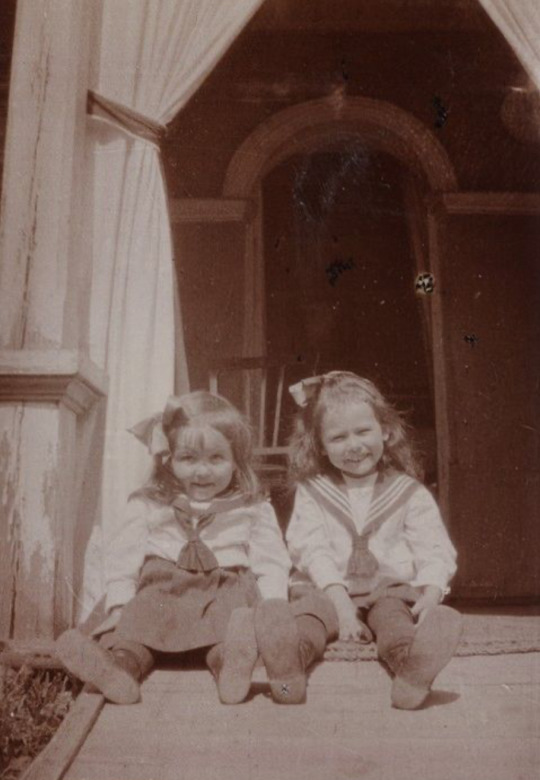

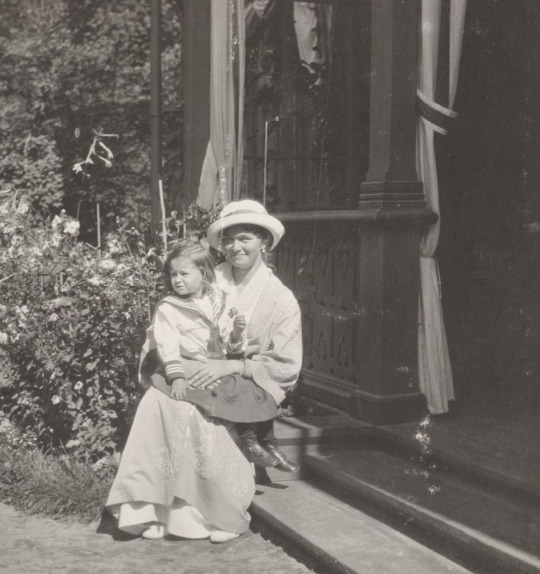
Anna Vyrubova’s nieces (children of sister Alya Vyrubova), Tatiana “Tanichka”, Olga, and Alexandra + Olga with Tanichka(?)
“Then we went to Anya's where we bathed and put to bed her three nieces, Alya’s daughters. Tatiana (the eldest, my goddaughter), Olga and Alexandra.”
— Diary entry of Grand Duchess Tatiana Nikolaevna, 24th July 1914
(ps. I’m not sure if the third photo is of Tanichka because I saw it labeled as a “small friend” but it looks like Tanichka so pls comment what you think and feel free to correct me!)
#olga nikolaevna#tatiana nikolaevna#otma#anna vyrubova#Alya Vyrubova#tanichka#tatiana#olga#alexandra#1914#letters and diaries#romanov
48 notes
·
View notes
Text
Tatiana Nikolaevna’s diary, 2nd/15th January 1913
“In the morning [we] four with Papa and Aunt Olga went to obednya at the lower regimental church. Father Alexander Vasiliev did the service, [he is] our teacher. Towards the end of obednya was moleben. Returned home, had breakfast together and also [with] Aunt Ksenia and Irina. Mama is in her [room] as she has a headache and heartache. In the afternoon [we] four with Papa, Aunt Olga and Irina went out for a walk. A. Ksenia left for home. We walked around our garden to Bablovo, then walked around the lake to the big church and back. A. Olga left for home. Olga, Irina and I sat together and talked. At 4 1/2 went downstairs to have tea with Papa and Mama. Stayed downstairs until 6 o’cl. Then went upstairs. Again sat with Irina and pasted in my album, then read. Sat with Mama, Olga and Anya and worked. At 10 o’cl. went to bed.”
3 notes
·
View notes
Note
I've read every single book I can find on the Romanovs but would like some help finding more books. I just found your blog and I love it!
Hello, thanks for your question. Here are some of my favourite more obscure books for those of you who have read all you can find and raided the libraries!
The Romanovs Under House Arrest: From the 1917 Diary of a Palace Priest edited by Marilyn Pfeifer Swezey
A short, but interesting and beautifully illustrated book that translated the diaries of Archpriest Afanasy Belyaev into English. It gives an insightful look into the last few months and weeks the Romanovs spent at the Alexander Palace and their faith.
LUNCH ON THE BALCONY: Recipes from the table of Russia’s last imperial family by Helen Azar
Can you tell I'm hungry right now? This book has some nice information about the Romanov's food, showing menus they used, letters and diary entries referencing food, and recipes used in the imperial kitchen that you can try at home.
Last Years of the Court at Tsarskoe Selo Volumes I and II by Count Alexander Spiridovich, edited and translated by Katherine Alexandra Hines
A lengthy look at the Count's role as a member of court and security duties. These volumes have some interesting passages about OTMA, though they focus more on the political activities of the Romanovs.
The Forgotten Tutor: John Epps and the Romanovs by John Epps and Dr. Gabriella Land
John Epps, an English tutor to the imperial children, remains a somewhat elusive figure in literature about the Romanovs, with very little information available about him in comparison to fellow tutors Gilliard and Gibbes. I have personally found it very difficult trying to track down this book as it was published a decade ago and seems to have only had one limited print run. The extracts that I have read have been very interesting. If you're interested in OTMA's childhood and education, this book is perfect for you - but good luck finding it! :(
A Few Years Before the Catastrophe: The memoirs of Sofia Ivanovna Tyutcheva edited and translated by George Hawkins
A very short but interesting read directly from the recollections of Sofia Ivanovna Tyutcheva who looked after the children. It gives a short but enlightening look at how things were run in the nursery.
When Miss Emmie Was in Russia: English Governesses Before, During and After the October Revolution by Harvey Pitcher
This book has a more sweeping view of Russian nannies in general, but has some nice tidbits of information about OTMA's nannies, such as Margaret Eagar (though she was Irish, not English!). If you enjoyed Charlotte Zeepvat's book on royal nannies that has some great info and sources on OTMA, this is a good follow up read.
Step-daughter of Imperial Russia by Natalia Mamontova Majolier
Recollections from Natalia "Tata", Grand Duke Mikhail Alexandrovich's beloved stepdaughter. Lots of information about growing up with Mikhail and experiencing the Revolution.
Russia, My Native Land: A U.S. Engineer Reminisces and Looks at the Present by Gregory Tschebotarioff (Chebotaryov)
Written by the son of Grand Duchess Olga and Tatiana Nikolaevna's fellow nurse and friend, Valentina Ivanovna Chebotaryova, this memoir gives a greater picture of Valentina's life by including extracts of her diary. It also has details about Gregory's experience serving in WWI.
Anastasia's Sisters: Their Diaries, Letters and Memories edited by Raegan Baker and translated by Catherine Hamel
A short book with extracts from Grand Duchesses Olga, Tatiana, and Maria's writings. I always find it interesting to read different translations of the same sources and find various changes made my each translator. As always, translations rely on the translator's discretion and interpretations.
The Many Deaths of Tsar Nicholas II by Wendy Slater
This book is an academic, somewhat cold and clinical, look at the deaths of the Romanov family. The compilation of scientific analysis (though this was published in 2007, so not accurate to recent discoveries) during the middle sections is the best part of this book, as the fictionalised narrative at the start doesn't appeal to me and the analysis during the latter stages veers off focus.
The Jewel Album of Tsar Nicholas II and a Collection of Private Photographs of the Russian Imperial Family by Alexander von Solodkoff
A lovely illustrated book - if you can afford it!! This regularly sells for over $100, but is very detailed and beautiful, including high-quality full-colour copies of Nicholas' "Jewel Album" with his annotations and marvellous drawings.
My Father by Maria Rasputina
For fans of the infamous Rasputin, this glimpse into how daughter Maria perceived her father is an interesting read. Rasputin is one of the most contentious and well-researched figures in this area of history, and reading his daughter's experiences and how she viewed his healing of Tsarevich Alexei is a unique viewpoint.
The Emperor Nicholas II: As I Knew Him by John Hanbury-Williams
Major-General Sir John Hanbury-Williams provides an intimate look at life during WWI in Russia, from the perspective of his role as an English representative at Stavka. Some interesting observations about Nicholas and Alexei.
Lost Tales: Stories for the Tsar's Children by Gleb Botkin
Gleb Botkin, only seventeen, composed and illustrated this series of tales (collected here as one book) for the imperial children during their imprisonment at Tobolsk. A lovely look into Gleb's artistic skills, and the interesting parallels between his animal characters and the revolution. Not necessarily a history book, but an interesting insight into life at Tobolsk.
In case I missed any, if you search #q and #answered on my blog it will come up with a list of previous questions, a lot of which relate to reading recommendations, so you might find some more suggestions there.
For information of a compilation of primary source writings written by the Romanovs that have been translated into English, see here
Happy reading!
15 notes
·
View notes
Text
Is Rupert the ringmaster of Blackthorn Hall’s enchantment?
On this week’s episode of KRP, we dug deep into the theory that the enchantment on Blackthorn Hall itself is compelling Julian and Emma to find the objects, which includes questioning Rupert’s legitimacy as a friendly ghost.
Here’s why we believe Rupert might be the ringmaster of the curse:
In Tatiana’s diary entry from the night she met Rupert, she mentions that he “snubbed” Gabriel (which she LOVED). This sets precedent that there’s a chance Rupert was similar in spirit/temperament to Tatiana.
Rupert tested Blackstairs when they first arrived. He wrote go away, tipped paints, etc. Once Emma read the diary and they had Ty’s ghost sensor, he leads them to the ouija board and then the Devil Tavern — he was testing their commitment and capabilities.
He’s pointing them toward objects, not his ring. If he was concerned about crossing over, he’d be leading them to his ring. (The ring is a sob story of sorts to distract Blackstairs from thinking of his involvement and to trust him.)
If Rupert loved Tatiana or was in cahoots with Benedict, it would make sense for him to want to stick around and see their evil plan unfold. Then he can worry about his ring and cross over, knowing he fulfilled his duty.
Look, we want to love Rupert. We’re big Blackthorn fans around here. BUT we’re starting to have A LOT of suspicions.
What do yinz think? Is Rupert Team Good or Team Evil?
Bry 🖤
#sobh#secrets of blackthorn hall#rupert blackthorn#julian blackthorn#emma carstairs#tatiana blackthorn#benedict lightwood#the shadowhunter chronicles#tsc#shadowhunters#the infernal devices#Cassandra Clare#kraig's retirement party#krp#krp ep 12
10 notes
·
View notes
Note
Hello, sorry to bother you again. I wanted to write something for Grace after chain of thorns and I'd like to include the other blackthorns that live in Leeds. Do you know in which book they're mentioned? Or something else that's mentioned about them? Thank you.
Hi!!! So the only mention of them ever is in a diary entry by Tatiana in the bonus short story series Secrets of Blackthorn Hall, all entries are on Tumblr at @secretsofblackthornhall and all it says is Tatiana saying that Rupert is not from the scandalous nasty crusty Cornwall Blackthorns, he’s from the Leeds Blackthorn line. That’s literally it 😭😭 just tatiana hating on the Cornwall Blackthorns but there’s no mention of any other Blackthorn by name. It’s not really something that I think was ever going to be expanded upon sadly so we just have that hole in the actual family tree/lineage of the Blackthorn family and even who’s line the current Blackthorns come from. But I digress LMAO!
2 notes
·
View notes
Text
Review: Louis Fenton’s new indie-rock anthem ‘Falling for You’ champions unreciprocated feelings with a dance-along attitude
After plays from BBC Introducing and Future Hits Radio with his debut single ‘Feels Like Home’, Buckinghamshire based indie-rock artist Louis Fenton now looks to return with the next piece to the puzzle. From exploring the highs of emotion around having a crush, his newest offering takes a turn for something a bit more intimate.
Though the title is just as bright and fairytale-esque as its predecessor, ‘Falling for You’ is not everything it seems on the surface, even when the glowing opening line beams ‘can’t remember the last time I’ve fallen for someone new, I looked straight into your eyes and I just knew.’ Loved-up and smitten by it, the sound replicates a similarly upbeat journey that bounces along in the form of mesmerising electric guitar strums, easy-going drums and a funky bassline, an introduction filled with energy that urges you get on your feet and have a good time. Things simmer slightly into the opening verse with more casual guitar strums and quick beats, at first still unapologetically sunny, but as the words shift the soundscape does too, the beats muffled for an apprehensive realisation: ‘just wish you’d see me, the way I see you.’ Pulling back to become more tentative and close to the heart, you quickly realise this confessional narrative is one not reciprocated in return, left with a million questions as to why. His spoken-sung approach to the lines fits the mood just as perfectly too, akin to reading an all-too-personal diary entry while still cleanly floating into the most gorgeously smooth of ranges.
The chorus lets loose still, dancing through the lows with vigorous guitar and thumping drums while Louis words’ cascade into powerful vocal heights that cannot be dimmed even in the heat of asking: ‘why can’t you be mine, am I wasting my time?’ Merging together the disheartened emotions that come with feeling not quite enough, stood on the sidelines as the one you love pines for another, Louis still manages to capture just as much of the thrill that comes with continually wondering if maybe something could be: ‘in the back of my mind, think I’ve found the one, but then I realise…’
Between the confused lines and the many, many questions, ‘are you playing games?’ , Louis replicates those situations that just don’t have an easy answer. Caught up on the smallest details that leave you wondering if there’s still a chance in being wanted in return, to the crushing blows that return every time you let it sink in your emotions aren’t shared, ‘Falling for You’ jumps between both the highs and lows of falling in love even when they’re not easy to admit. A sincere bridge slows things down even more, carefully building from piano keys into an anthemic high filled with multiple harmonised backing vocals and chant-along lines. These vocals are just as torn and muddled as the emotions buried within, as ‘Falling for You’ delivers a tale just under three minutes that’ll likely relate to millions across the globe. If you’ve ever been there, or if you’re there right now, don’t miss out on freeing yourself from the pain by pressing play on ‘Falling for You’ for yourself here.
Written by: Tatiana Whybrow
Photo Credits: Unknown
// This coverage was supported and created via Musosoup, #SustainableCurator.
0 notes
Photo

Nikolai Nikolaevich Rodionov, Maria Nikolaevna, Olga Nikolaevna, Pavel Voronov and Tatiana Nikolaevna, 17th/30th December 1913
“Sailed out to sea at 5 in the morning. The yacht rocked a little, nice. Arrived in Sevastopol at 8.35 and docked. Salutations. I was in the control room with S [Pavel Voronov]., Rodionov and Kublitzky. At 10 in the morning Papa went to consecrate something at the aviation school. We were there too until breakfast at 12 1/2. In the afternoon Mama was lying down on the quarter deck. Very warm and a warm wind. Her heart is 2 1/2. In the afternoon [we] took lots of pictures on the deck.
Then sat in control room with my [code: loved one] S., he wrote in the log journal, and we stayed there. He does not feel well - headache and cough. It is so nice to be with him. Papa returned after 4 o’cl. Had tea with all the officers at 5 o’cl. Then went to look at the train with N.P., S., Rodionov and Ippolit. I sat on the deck, but S. did not come. Extremely sad. A molebna was held on the deck at 7.40. After that the officers and the crew lined up on the wharf, we bid our farewells and left. [It was] terribly hard. 13 degrees. The yacht illuminated our way with searchlights. Went to bed at 10 o’cl. Mama is already in bed. May the Lord save everyone and S.”
- Olga’s diary, 17th/30th December 1913
“Sailed off to Sevastopol at 5 o’cl. in the morning and arrived at 8 o’cl. 35 min. I got up at 8 o’cl. At 10 o’cl. Papa went to visit some place, something along the lines of an aviation school. We sat upstairs with N.P. and P.A. Had breakfast with everyone upstairs. N.P. was on watch duty from 12 - 4 but I still managed to see him a lot. When we were sitting with the sisters and P.A. the other officers also came over.
At 4 1/2 Papa returned with almost all the officers and had tea. Later with N.P., P.A. and Ippolit went to see our train. Then sat with N.P. At 7 o’cl. 40 min. there was a moleben on the deck. It was terribly nice to pray with them for the last time. At 7 o’cl. 50 min. docked at the pier and said goodbye to our officers and the crew. It is so tiresome and awful to depart from the dear yacht and leave all our best friends. Had dinner with everyone on the train.”
- Tatiana’s diary
“In the morning arrived at Sevastopol. At breakfast sat with Nilov and Komarov. In the afternoon sat and talked with Pi, Kolya and Kotenok. Had tea [we] 4 with Mama, Papa, ladies and officers. Sat with Kolya and looked at the train. There was a prayer service on the deck and then we left the yacht to the train and it departed. It was very boring. At dinner sat with Nilov and Papa.”
- Maria’s diary
#trans: helen azar#maria nikolaevna#olga nikolaevna#tatiana nikolaevna#1913#1910s#romanov#romanovs#maria diary entry#olga diary entry#tatiana diary entry#grand duchess maria#grand duchess olga#grand duchess tatiana
87 notes
·
View notes